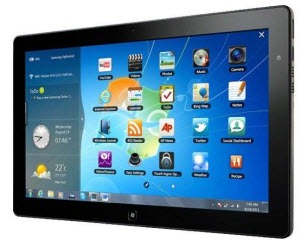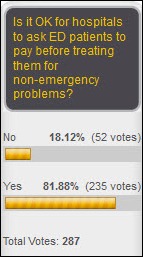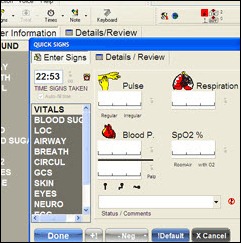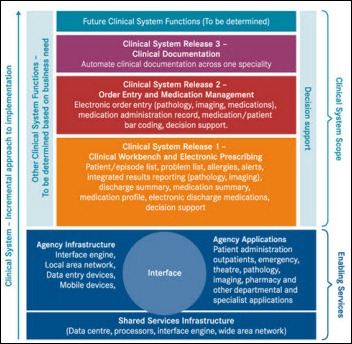There was a recent report pointing to increased Medicare costs when patients returned to traditional Medicare, of course assuming that…
Monday Morning Update 5/21/12
From Determinant: “Re: Cerner. Have you heard of them trying to sell ProFit patient accounting for both hospitals and practices? Looks like Cerner wants to complete head to head with Epic by offering one combined solution set for hospital, professional, and physician clinic billing.” I haven’t heard that. Anyone?
From The PACS Designer: “Re: Samsung Slate. One of the drawbacks of the iPad when it comes to viewing healthcare legacy apps is its small size. This hampers the effort to move these apps to a tablet display. Samsung has released a tablet called Slate with a 11.6 inch form factor, which should make the legacy app transition effort easier.” Samsung seems to be leading the “bigger than Apple is better since we can’t beat them otherwise” charge with its 3×6” Galaxy smart phone (or “smablet”) and now the 11.6” Slate. You’re going to look like a tool yapping into the bigger-than-your-hand Galaxy that covers the whole side of your head like Gordon Gekko’s 1987-era cell phone in Wall Street (which in turn looked like a Vietnam War walkie talkie), so I suggest budgeting for a headset and to arrange tailoring services for pocket expansion. The Slate will basically be the size of the entry level MacBook Air screen without the keyboard, meaning you’re back to a laptop size again other than the touch screen and a lot more money. Wasn’t portability the whole point of these devices? All of this makes me think that Windows 8 could be a really big deal since it seems that everybody wants some features of iOS (apps, touch, crisp display) but doesn’t care too much otherwise, and Win 8 will of course run on cheaper commodity hardware.
From Real Doll: “Re: former Cerner COO Paul Black on the board of Allscripts. The other new board member is from UPMC, which has close Cerner ties. Could be a merger in the works.” Unverified. I suppose anything is possible and Cerner isn’t all that strong on the ambulatory side, but that would be an ugly marriage.
Listening: Material Issue, a Chicago-based guitar-heavy power pop trio from the mid-80s. The frontman-founder killed himself in 1996, but the band left behind some great music. I also looked back to my February 13 post as Van Halen started their tour, when I said, “Check out their tour, but I’d be cautious about buying tickets for anything after the Boston show since tours seem to bring out the squabbling between the Van Halen brothers and whoever their lead singer is at the moment (Roth, Hagar, Cherone, lather, rinse, repeat) and the whole thing could go down in flames (think The Eagles without the concert-dollar greed that makes them pretend to get along.)” Sure enough, the band has postponed the remainder of their tour, although I missed the date — the Boston show was March 11 and it lasted a few weeks longer than that.
It’s OK to ask ED patients with non-emergent problems to pay before treating them, say 82% of respondents. New poll to your right, from the next story down: will Cerner and Epic be the only hospital information system survivors?
Cerner CEO Neal Patterson says at Cerner’s shareholder meeting that the company could be pulling in $10 billion per year in revenue by 2020, almost five times today’s total. He also says he’ll probably retire before then. When asked about the complexity of meeting provider technology needs, he said Cerner and Epic might be the only companies left standing. The “and Epic” part is not very Neal-like, so maybe he’s already mellowing on his way to the rocking chair.
Long-term care provider Deseret Health Group chooses HealthMEDX Vision to manage patient records across its 20 locations.

On HIStalk Practice, Inga interviews John McConnell, who sold more than $1 billion worth of companies that weren’t Eclipsys (Medic and A4) to what is now Allscripts.
Eight physician groups in the Kingsport, TN area start the OnePartner HIE, which will use the Siemens MobileMD platform.
The Twin Cities paper profiles the use of SafetyPad by Hennepin County paramedics. The tablet app, developed by Open Inc., receives 911 information, records vital signs, provides checklists, and notifies the ED that the patient is inbound. The hospital’s server receives a copy of the chart, looks for trends that may signal an epidemic, and bills insurance companies quicker than on paper (10 days vs. 90).
Here’s your weekly dose of HIS-tory, in which Vince talks about product names.
The FCC will vote this week on allocating a chunk of the wireless spectrum to Medical Body Area Networks, in which wearable patient sensors would communicate wirelessly to a local base station to send information back to physicians. FCC Chairman Julius Genachowski lauded the technology, citing examples such as remote EKGs, smart pill boxes, and diabetes management devices, also pointing out that half of hospital inpatients aren’t monitored and could potentially be with MBANs. If the rules are approved to reallocate the spectrum formerly used by commercial test pilots, the US would be the first country in the world with a dedicated spectrum for MBANs. He specifically mentioned that GE and Philips are working on the technology.
The results of Dr. Oz’s 15-minute physical on 1,000 Philadelphians using Practice Fusion’s free EMR: 43% were obese, another 29% were overweight (meaning a total of 72% weighed more than they should), 43% had high blood pressure, and 40% had pre-diabetes. Two patients were found to have significant problems (blood chemistry, hypertension) and were admitted to the hospital. Practice Fusion compared the data from its records on 40 million patients to conclude that more of those 1,000 patients were hypertensive than in several other large cities. The article says the Dr. Oz show chose Practice Fusion over several other EMRs that were considered, including Epic and drchrono.
Reading Hospital (PA) reports that a now-fired employee exposed the medical information of 12 patients by printing their billing information and using it in a training class.
A Department of Homeland Security bulletin warns that connecting medical devices to wireless networks is risky, and organizations that do it need to implement a really good security program. They mention the VA’s use of virtual LANs with access control lists as one way to keep unauthorized users out. A problem is that more devices are using commercial operating systems rather than custom-developed embedded ones, meaning they are more susceptible to malware.
A team of electrical engineering students from Portland State University wins Cornell Cup USA Presented by Intel for its prescription drug identification device, which provides near-instantaneous identification of tablets and capsules from their image. The students came to the university through the Intel Vietnam Scholars Program, in which interns from the Intel’s Ho Chi Minh City factory study engineering at Portland State.
In Australia, the government of Victoria finally kills off the HealthSMART project that was to have provided hospitals with software from Cerner, iSoft (now CSC), and InterSystems. The initial $318 million budget had run up a $557 million tab before funding was ended. Only four health services are live today of the 10 the government had promised would be running by 2007. Most folks blame mismanagement and poor planning rather than the vendors.
The Chicago business paper reports that Merge Healthcare Chairman Michael Ferro and companies he’s invested in have earned $9.3 million in side deals from Merge. Only four of the 11 related-party transactions were reviewed by independent directors. Shares have dropped 61% in the last couple of months.
The former assistant dean of Temple University’s medical school, along with the university, will pay more than $1 million to settle Medicare fraud charges in which $4.5 million in plastic surgery work was billed to Medicare but performed by unsupervised medical residents. The doctor is serving a seven-year term in federal prison for 150 counts of fraud.
The Tucson newspaper recognizes Sunquest Information Systems interface programmer Kenny Wickert, who throws annual cookouts at work to collect co-worker donations for a Tucson child protection organization. Each event raises around $5,000. Says Kenny, who has worked for Sunquest for 21 years, “I see people dropping 20 and 30 bucks in the jar for a burger … We grew up just dirt-poor, and she always made it work with what we had. It’s kind of fair that I give back now that I can.” The award was given by Ben’s Bells, a kindness recognition program started by the mother of two-year-old Ben, who died when a respiratory infection caused his airway to swell shut while he was playing.
I lauded HealthNovation President and CEO Mike Mosquito at HIMSS in Las Vegas after observing his sartorial splendor, explaining as I asked to take his photo that Inga would be impressed with his truly sharp-looking outfit. Here’s a shot of him taken by Jennifer Dennard at last week’s Georgia HIMSS golf tournament, pulling off a great look despite what might appear to a highly questionable choice of trousers even in the “go to hell pants” world of golf clothing (I’m thinking Rodney Dangerfield’s Al Czervik in Caddyshack). I found by searching that I ran a photo of Mike from the same tournament last year, in which he was equally resplendent. I should get him to take a pic of his closet contents.
The event funded $2,000 scholarships for Ana Alston (Georgia Health Sciences University), Tiffany Formby (Georgia Tech), Laura Griggs (College of CoastalGeorgia), Lars Moen (Georgia State), and Laura Sims (Georgia Tech).













Vince (or anyone else out there), ever hear of something called Harmony? There were hundreds out there. It was a front end for the SMS financial hosted stuff, replacing the 4 phase furniture. Pretty early client server stuff that really was used out there. How the name came about…well, it’s a good (but short) story.
Regarding Cerner competing with Epic through a single billing / rev cycle tool to handle hospital, provider and clinic billing… I heard that Cerner and one of its larger customers are in a joint development effort to do just that. (I can provide the customers name if you would like to contact me. )
Many thanks for the update on what’s happening to the HIT programme in Australia– an important development indeed. I embellished the information and posted it on a physician-only website:
The government of Victoria (Australia) finally has decided to kill off its HealthSMART health information technology project after 6 years of funding it, when the costs had increased from the initial $318 million budget to more than $557 million. The program was marked with major delays, a lack of progress, mismanagement and poor planning.
This project was to have provided hospitals with software from Cerner, iSoft (now CSC), and InterSystems. Many will recall that the cornerstone software program, Cerner, was also used in Great Britain before its programme bit the dust last year.
As far as many of the end-users are concerned –
1) “The software is overly demanding and complex and does not seem to meet their expectations for functionality and ease of use.”
2) “It seems clear that there are a range of functional and performance issues which have not been addressed in a reasonable time from the perspective of the end users.”
3) “The systems have imposed a range of workflow changes and additional work that have frustrated end-users who are very resistant to change that is poorly explained and justified being pushed onto them.”
4) “That the state public health systems have failed to consider local factors during what are rather rigid state-wide implementation roll outs and that this has meant considerable end-user annoyance with what has been forced upon them.”
Heard these before? Yup- this program had very many similarities to the HITECH Act signed by President Obama into law in the USA in 2009, which had tried to force clinical decision support, CPOE, interoperability, eRx, and meaningful use on its practitioners. In theUSA, the same thing will happen to our taxpayer dollars- the money will all be eventually wasted in a system doomed to fail.
In the past 2 weeks the high-flying CERN stock has fallen some 10%.
I’m sure that Australian physicians will be celebrating this development this weekend. As CNBC’s Rick Santelli, my Tea Party hero, in 2009 gave his famous rant which still applies to the unfunded mandates like HITECH which was passed to prop up the EHR industry on the backs of taxpayers and physicians:
“I’ll tell you what. I have an idea. The new administration who thinks it’s big on computers and technologies… how about this, Mr. President/new administration, why don’t you set up a website to have people vote on the internet as a referendum to see if we want to subsidize the losers [HIT vendors]… and instead reward people who can carry the water [private practice physicians] instead of drink the water… PRESIDENT OBAMA- ARE YOU LISTENING?”
Bibliography:
— http://histalk2.com/2012/05/19/monday-morning-update-52112/
— http://www.health.vic.gov.au/healthsmart/clinsysoverview.htm
— http://www.hospitalhealth.com.au/editorial/ehealth/developing-and-implementing-the-software-and-systems-to-support-ehealth-is-not-easy
— http://finance.yahoo.com/echarts?s=CERN+Interactive#symbol=cern;range=1y;compare=;indicator=volume;charttype=area;crosshair=on;ohlcvalues=0;logscale=off;source=undefined;
— http://www.youtube.com/watch?v=zp-Jw-5Kx8k
Re: HealthSMART
A program that determines, pays for, and requires a single set of vendors and systems to be used by all providers is very different from a program that encourages providers to invest in tools that satisfy a number of requirements. but can be chosen freely from a variety of options based on local preference and needs. So while there may be similarities in the end goals, there aren’t many similarities in the tools and means used to achieve these goals by the HealthSMART and NPfIT programmes on one hand and the HITECH act on the other.
I believe Facebook’s IPO is another data point on why Vocera was likely priced properly (see my earlier post- http://histalk2.com/2012/04/04/healthcare-it-from-the-investors-chair-4412/)
While some think the moderate performance of the Facebook IPO shows the deal was priced well (not leaving any money on the table), in reality, I’d argue that it was priced both too high and with too much stock allowed (especially from insiders) and so the underwriters will be supporting the stock for the next week or so. It will be interesting to see what happens when they step back from doing so.
Or, in other words – InvestorChair still “likes” VCRA IPO pricing!
Best to all,
Ben
RE: Cerner and Epic be the only hospital information system survivors?
Neal Patterson is fooling himself. The actual question should be whether it will only be Epic and MEDITECH standing.
Cerner is not cost competetive with MEDITECH, which will be a much bigger factor the longer the recession goes and while Epic has done well at large hospitals, as they move into smaller hospitals the problems with their implementation methodology and crippling ongoing costs are coming out. Based on these factors and the simple fact that their market share has not moved in years. MEDITECH is not going away.
Cerner acquiring Allscripts is stupider than Allscripts acquiring Eclipsys.
Stupider things happen all the time in HIT.
Just sayin.
re: Samsung Slate. I’ve been waiting for a Windows alternative to the iPad and picked this up a few weeks ago. It’s actually very portable (i was able to ditch the laptop bag and now only carry the folding case), the touch is much better than I thought on Win7, and it’s lightening fast with the i5 compared to other Win tablets with the Atom. Honestly, the main drawback right now is that it’s so new, I can’t find an all in one stand / keyboard portfolio, but I’m sure that’s a matter of time.
The Cerner approach to selling their rev cycle products as mentioned by Determinant is the approach they took with us late last year (they lost). Of course, they couldn’t take us to a site that had both financials and clinicals up and running.
In response to David:
You hit a very important point with regard to the future in HCIT. Healthcare revenue will fall in the years ahead and this wiill make total costs of (TCO) systems much more important in the decision making process.
Imagine the vendor with a TCO less than Meditech and features and functionality on par with Epic and Cerner. That vendor will own the market.
Think it can’t happen? Don’t bet against it.
don’t count MEDITECH out.. They’ve helped to define the Healthcare IT industry over the past 40 years and with 1 in 4 hospitals utilizing their solutions they aren’t going anywhere..in fact they’re the vendor most well positioned to operate successfully in a healthcare reform based HIT industry..